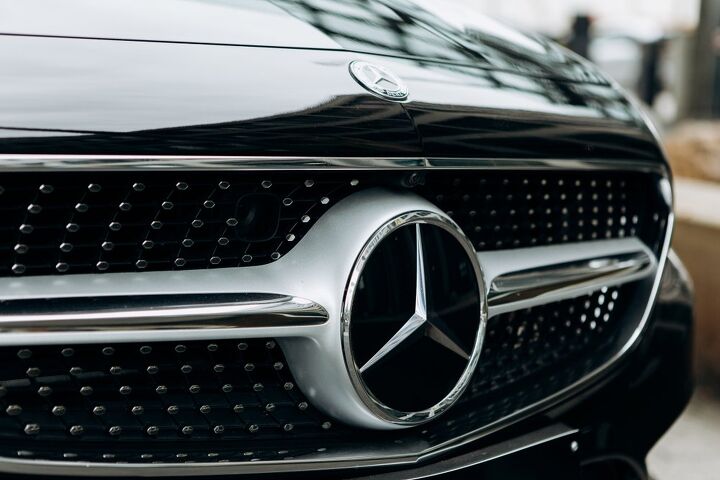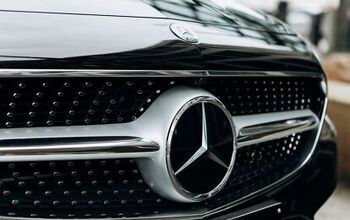Daimler Is Just Going to Be Mercedes-Benz, Says CEO

Daimler had decided some serious changes need to be made before the end of 2021, including a name swap and separate listing for its commercial truck division. While the reason given was to better facilitate the company’s transition toward a “zero- emissions and software-driven future,” investors have been critical of Daimler’s share price after it cratered in March of last year. Though we would argue the bigger concern is the automaker’s lackluster (or absent) growth and declining revenue since 2018.
Regardless, CEO Ola Källenius believes continued changes to the firm’s corporate structure are the only way to go. By 2022, Daimler will simply be known as Mercedes-Benz and have spun off Daimler Trucks with its own listing on the Frankfurt stock exchange.
“This is a historic moment for Daimler,” Ola Källenius, Chairman of the Board of Management of Daimler and Mercedes-Benz, said in Wednesday’s release. “It represents the start of a profound reshaping of the company. Mercedes-Benz Cars & Vans and Daimler Trucks & Buses are different businesses with specific customer groups, technology paths and capital needs. Mercedes-Benz is the world’s most valuable luxury car brand, offering the most desirable cars to discerning customers. Daimler Truck supplies industry leading transportation solutions and services to customers. Both companies operate in industries that are facing major technological and structural changes. Given this context, we believe they will be able to operate most effectively as independent entities, equipped with strong net liquidity and free from the constraints of a conglomerate structure.”
By raising the profitability of Daimler Trucks, it’s also assumed that the unit will be in a better position to develop and implement advanced technologies. This includes the obligatory battery and fuel-cell trucks, in addition to autonomous driving functionalities. There’s also a customer retention program in the works that will be tied to mobility and data services.
From Daimler:
As part of a more focused corporate structure, both Mercedes-Benz and Daimler Truck will also be supported by dedicated captive financial and mobility service entities, driving sales with tailor-made financing, leasing and mobility solutions, increasing retention and building customer loyalty. In this process, the company plans to assign resources and teams from today’s Daimler Mobility to both Mercedes-Benz and Daimler Truck.
While the exact timing has yet to be decided, Daimler stated that “a significant majority stake” in the trucking business will be distributed to shareholders. Daimler Truck will have a wholly independent management team and an independent Chairman of the Supervisory Board. It’s expected to be listed on the Frankfurt stock exchange by the end of 2021. A separate announcement regarding the name change (and any other tweaks made to Mercedes-Benz) has also been planned.
“We have confidence in the financial and operational strength of our two vehicle divisions. And we are convinced that independent management and governance will allow them to operate even faster, invest more ambitiously, target growth and cooperation, and thus be significantly more agile and competitive,” Källenius stated.
[Image: Franz12/Shutterstock.com]

A staunch consumer advocate tracking industry trends and regulation. Before joining TTAC, Matt spent a decade working for marketing and research firms based in NYC. Clients included several of the world’s largest automakers, global tire brands, and aftermarket part suppliers. Dissatisfied with the corporate world and resentful of having to wear suits everyday, he pivoted to writing about cars. Since then, that man has become an ardent supporter of the right-to-repair movement, been interviewed on the auto industry by national radio broadcasts, driven more rental cars than anyone ever should, participated in amateur rallying events, and received the requisite minimum training as sanctioned by the SCCA. Handy with a wrench, Matt grew up surrounded by Detroit auto workers and managed to get a pizza delivery job before he was legally eligible. He later found himself driving box trucks through Manhattan, guaranteeing future sympathy for actual truckers. He continues to conduct research pertaining to the automotive sector as an independent contractor and has since moved back to his native Michigan, closer to where the cars are born. A contrarian, Matt claims to prefer understeer — stating that front and all-wheel drive vehicles cater best to his driving style.
More by Matt Posky
Latest Car Reviews
Read moreLatest Product Reviews
Read moreRecent Comments
- Carson D Just don't be the whistleblower who reports on the falsification of safety data. That's a deadly profession.
- Carson D I'd have responded sooner, but my computer locked up and I had to reboot it.
- Todd In Canada Mazda has a 3 year bumper to bumper & 5 year unlimited mileage drivetrain warranty. Mazdas are a DIY dream of high school auto mechanics 101 easy to work on reliable simplicity. IMO the Mazda is way better looking.
- Tane94 Blue Mini, love Minis because it's total custom ordering and the S has the BMW turbo engine.
- AZFelix What could possibly go wrong with putting your life in the robotic hands of precision crafted and expertly programmed machinery?


































Comments
Join the conversation
Will any of this help the company(ies) sell more vehicles? Probably not. Will it help them make more profit by finagling the taxes a bit more? Most likely. Will they still share the parts bin? Yeah, they'll figure out a way. Does anyone really care about this? Well, not really, no. Will Mercedes still be the German Hyundai, at least in the looks department? Signs point to yes.
Always been a little bit of a confusing name, seeing as the only Daimler branded cars I've ever seen have been range topping Jaguars (I think they used the Vanden Plas name in the states) Mercedes car range was strangely never harmed by their badge being used on vans, buses and trucks. I'd say more harm has came from the easy-finance Renault-Megane-based A class, a status symbol equivalent to a Ford Focus.